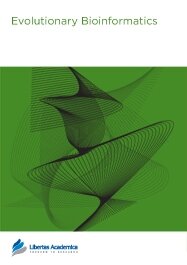

Publication Date: 03 Jul 2009
Type: Methodology
Journal: Evolutionary Bioinformatics

Comparative analysis is used throughout biology. When entities under comparison (e.g. proteins, genomes, species) are related by descent, evolutionary theory provides a framework that, in principle, allows N-ary comparisons of entities, while controlling for non-independence due to relatedness. Powerful software tools exist for specialized applications of this approach, yet it remains under-utilized in the absence of a unifying informatics infrastructure. A key step in developing such an infrastructure is the definition of a formal ontology. The analysis of use cases and existing formalisms suggests that a significant component of evolutionary analysis involves a core problem of inferring a character history, relying on key concepts: “Operational Taxonomic Units” (OTUs), representing the entities to be compared; “character-state data” representing the observations compared among OTUs; “phylogenetic tree”, representing the historical path of evolution among the entities; and “transitions”, the inferred evolutionary changes in states of characters that account for observations. Using the Web Ontology Language (OWL), we have defined these and other fundamental concepts in a Comparative Data Analysis Ontology (CDAO). CDAO has been evaluated for its ability to represent token data sets and to support simple forms of reasoning. With further development, CDAO will provide a basis for tools (for semantic transformation, data retrieval, validation, integration, etc.) that make it easier for software developers and biomedical researchers to apply evolutionary methods of inference to diverse types of data, so as to integrate this powerful framework for reasoning into their research.
PDF (6.64 MB PDF FORMAT)
RIS citation (ENDNOTE, REFERENCE MANAGER, PROCITE, REFWORKS)
BibTex citation (BIBDESK, LATEX)
XML
PMC HTML
Publishing in Air, Soil and Water and Water Research was the best experience I have had so far in an academic context. The review process was fair, quick and efficient. I congratulate the team at Libertas Academica for a very well managed journal.Magnus Karlsson (IVL Swedish Environmental Research Institute, Stockholm, Sweden) What Your Colleagues Say
Copyright © 2012 Libertas Academica Ltd (except open access articles and accompanying metadata and supplementary files.)
FacebookGoogle+Twitter
PinterestTumblrYouTube